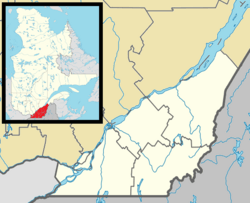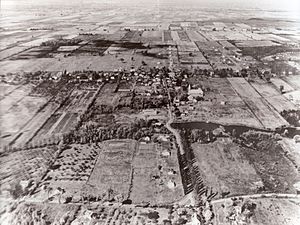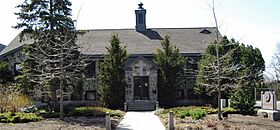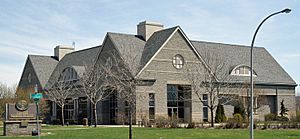Saint-Bruno-de-Montarville facts for kids
Quick facts for kids
Saint-Bruno-de-Montarville
|
||
|---|---|---|
|
City
|
||
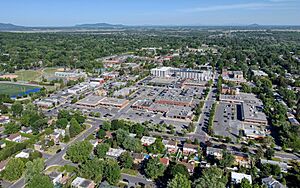
Downtown Saint-Bruno-de-Montarville
|
||
|
||
| Motto(s):
Fiers de nos traditions
(French for "Proud of our traditions") |
||
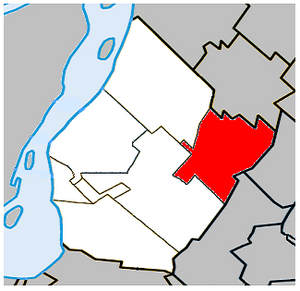
Location within the urban agglomeration of Longueuil
|
||
| Country | ||
| Province | ||
| Region | Montérégie | |
| RCM | None | |
| Agglomeration | Longueuil | |
| Founded | 1842 | |
| Constituted | 1 January 2006 | |
| Area | ||
| • Total | 43.30 km2 (16.72 sq mi) | |
| • Land | 42.85 km2 (16.54 sq mi) | |
| Population
(2021)
|
||
| • Total | 26,273 | |
| • Density | 613.2/km2 (1,588/sq mi) | |
| • Pop 2016-2021 | ||
| • Dwellings | 10,629 | |
| Demonym(s) | Montarvillois,(e) (French) | |
| Time zone | UTC−5 (EST) | |
| • Summer (DST) | UTC−4 (EDT) | |
| Area code(s) | 450 and 579 | |
| Highways |
||
Saint-Bruno-de-Montarville is a city in southwestern Quebec, Canada. It's a suburb of Montreal, located on the south side of the Saint Lawrence River. The city sits near Mont Saint-Bruno, which is one of the Monteregian Hills. In 2021, about 26,273 people lived here.
Saint-Bruno-de-Montarville is well-known for Mont Saint-Bruno. This mountain is home to the Mont-Saint-Bruno National Park and Ski Mont Saint-Bruno. The ski hill is a popular place for skiing and learning how to ski.
Contents
What's in a Name?
Have you ever wondered how Saint-Bruno-de-Montarville got its name? There are two main ideas!
Bruno and Montarville
One idea is that the city was named after Bruno of Cologne. He was a famous person from history. The "Montarville" part might come from an old land area called a seigneury. A seigneury was like a large estate.
The name "Montarville" sounds like a village in France called Montharville. This French village's name might mean "Haric's farm's mount." Haric was a Germanic name. But some people think this idea is a bit strange. This is because "mont" (French for mountain) is Roman, and "-ville" is a Norman place name.
Mountain and Boucherville
Another idea comes from Quebec's naming experts. They think "Montarville" could be a mix of two words:
- "Montagne" (which means mountain in French).
- "Boucherville," named after Pierre Boucher de Boucherville. He was the first seigneur (landowner) in the area.
This idea makes sense because Boucher's family members later used names like Montarville. The "Saint Bruno" part might have come from François-Pierre Bruneau. He bought the seigneury later, and his name was changed a little to sound like Saint Bruno.
A Look Back in Time
Let's explore the history of Saint-Bruno-de-Montarville!
The Montarville Seigneury
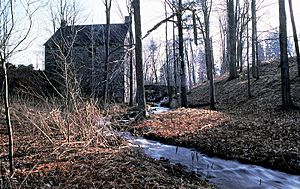
In 1710, a man named Pierre Boucher de Boucherville Junior was given the Montarville seigneury. This was by the governor of New France, Philippe de Rigaud de Vaudreuil. For a while, no one lived there, and the land wasn't cleared.
The Boucher family owned this land until 1829. Then, René Boucher de la Bruère sold half of it to François-Pierre Bruneau from Montréal. After Bruneau died in 1851, his brother Oliver-Théophile Bruneau became the last seigneur. This was because the seigneury system ended in 1854.
Farming was the main activity in the area. But Montarville also used the power of water from Mont Saint-Bruno. The mountain had many ponds and streams. The first water mill was built in 1725. By the 1800s, there were six mills. These mills helped grind grain, cut wood, tan leather, and process wool.
During the 1800s, farming also grew. People started raising more animals, planting orchards, and collecting maple syrup.
From Parish to City
In the early 1800s, families living near the mountain belonged to different church areas. This meant they paid church taxes to different places. In 1809, they asked to form their own church area, called a parish. But their request was turned down.
Thirty-three years later, in 1842, the people of Montarville tried again. About sixty people signed a petition. This time, the Bishop of Montreal agreed. The parish of Saint-Bruno was created. François-Pierre Bruneau was honored by naming the parish after Saint Bruno.
In 1845, Saint-Bruno became a municipal corporation. This was part of a plan to modernize local governments. At that time, about 800 people lived there. The next year, in 1846, the parish municipality of Saint-Bruno was officially born.
For a few years, Saint-Bruno was part of Chambly. But in 1855, it became fully independent. Its two names, "Saint-Bruno" and "Montarville," were joined together. This is the name we still use today. Saint-Bruno-de-Montarville officially became a city in 1958.
Joining and Separating
In the early 2000s, the Quebec government wanted to merge many cities. In 2002, Saint-Bruno joined other cities on Montreal's south shore. They formed the larger city of Longueuil.
However, many people were not happy about this. After a public vote, Saint-Bruno decided to separate from Longueuil. On January 1, 2006, it became its own city again. But it still remains part of the larger Longueuil area. This means Longueuil helps provide some services to the people of Saint-Bruno.
Population Facts
|
|||||||||||||||||||||||||||||||||||||||||||||||||||||||||||||||||||||
In 2021, the population of Saint-Bruno-de-Montarville was 26,273 people. This was a small increase of 0.3% from 2016. The city has a land area of 42.85 square kilometers. This means there are about 613 people living in each square kilometer.
Languages Spoken
The 2021 census found that most people in Saint-Bruno-de-Montarville speak French. About 85% of residents speak French as their first language. About 11% of residents speak English as their first language. The next most common first language is Spanish.
| Native language | Population | Pct (%) |
|---|---|---|
| French | 21,265 | 82.0% |
| English | 2,045 | 7.9% |
| Both English and French | 615 | 2.4% |
| French and a non-official language | 180 | 0.7% |
| English, French and a non-official language | 40 | 0.2% |
| English and a non-official language | 35 | 0.1% |
| Spanish | 405 | 1.6% |
| Arabic | 235 | 0.9% |
| Portuguese | 145 | 0.6% |
| Mandarin | 140 | 0.5% |
| Russian | 105 | 0.4% |
| Romanian | 100 | 0.4% |
| Italian | 90 | 0.3% |
| German | 70 | 0.3% |
| Polish | 50 | 0.2% |
| Iranian Persian | 45 | 0.2% |
| Vietnamese | 30 | 0.1% |
| Ukrainian | 25 | 0.1% |
| Dutch | 25 | 0.1% |
| Greek | 25 | 0.1% |
Fun Things to Do
Saint-Bruno-de-Montarville is located at the base of Mont Saint-Bruno. This mountain is part of the Monteregian Hills. It's a great place for outdoor activities!
You can visit Parc National du Mont-Saint-Bruno, which is a provincial park. It's perfect for hiking, biking, and enjoying nature. In winter, you can go skiing at Ski Mont Saint-Bruno.
Getting Around
Saint-Bruno-de-Montarville has good transportation options. You can take the train from the Saint-Bruno station. This train is part of the Réseau de transport métropolitain's Mont-Saint-Hilaire line. Local buses are also available through the Réseau de transport de Longueuil. Major highways like A-30 and QC-116 also pass nearby.
Schools in Saint-Bruno
The city has several schools for children and teens.
- The French school board, Commission scolaire des Patriotes, runs three elementary schools: École Albert-Schweitzer, École De Montarville, and École Monseigneur-Gilles-Gervais. They also have one high school: École Secondaire du Mont-Bruno.
- The English school board, Riverside School Board, oversees Mount Bruno School and Courtland Park International.
Famous People from Saint-Bruno
Many interesting people have lived in Saint-Bruno or have connections to the city:
- Maryse Andraos, a writer
- Joël Bouchard, a retired professional NHL hockey player
- Claude Crépeau, a computer scientist
- L. Denis Desautels, a former Auditor General of Canada
- Guy Laliberté, who founded Cirque du Soleil
- Georges Larivière, a professor, writer, and ice hockey coach
- Marie-Mai, a pop singer
- Serge Savard, a retired professional NHL hockey player
- Sword, a Canadian heavy metal band
- Maxime Talbot, a professional NHL hockey player
- Sébastien Leblanc, a retired professional tennis player
- Annette and Cécile Dionne, famous quintuplets who survived infancy
Images for kids
See also
 In Spanish: Saint-Bruno-de-Montarville para niños
In Spanish: Saint-Bruno-de-Montarville para niños
 | Tommie Smith |
 | Simone Manuel |
 | Shani Davis |
 | Simone Biles |
 | Alice Coachman |



